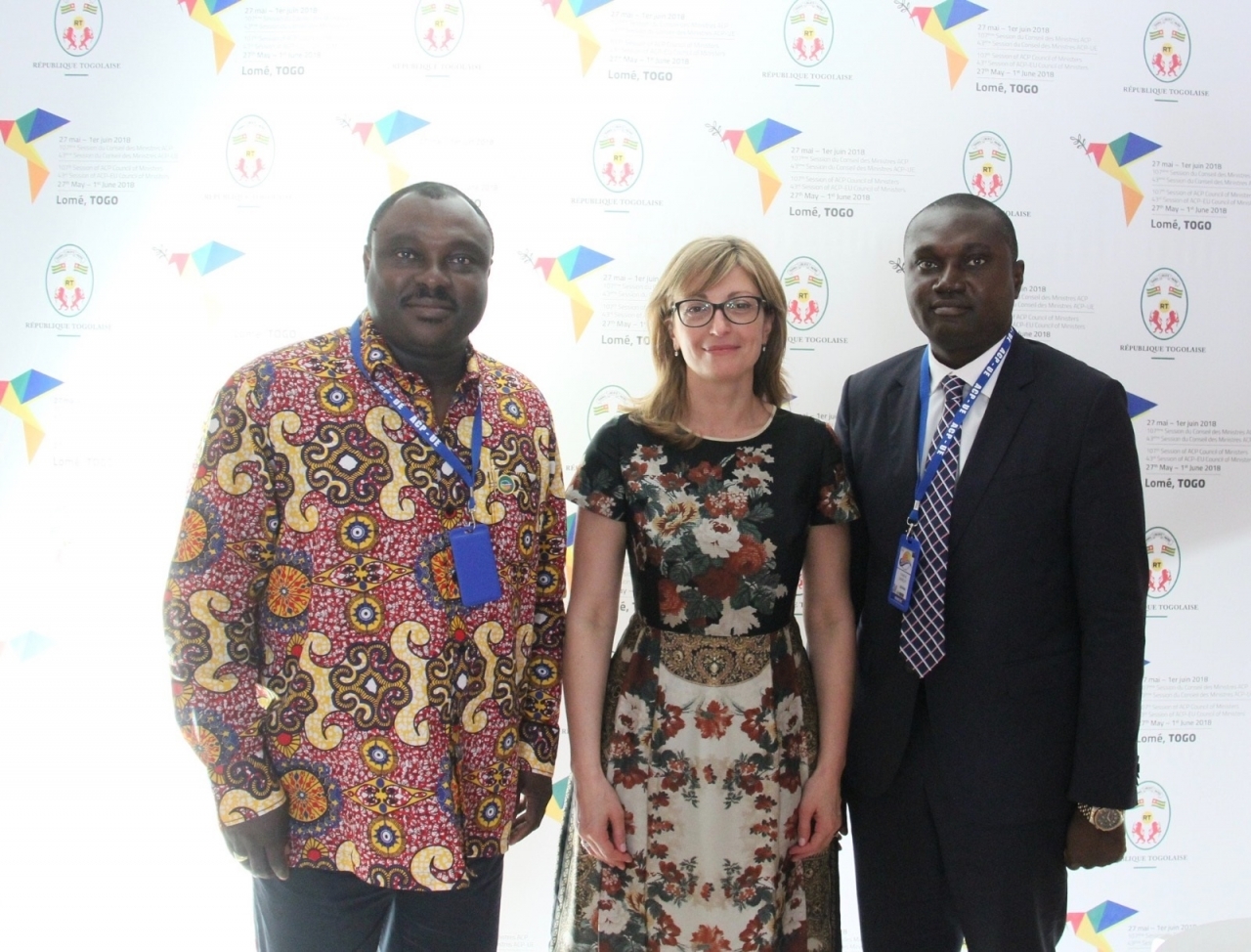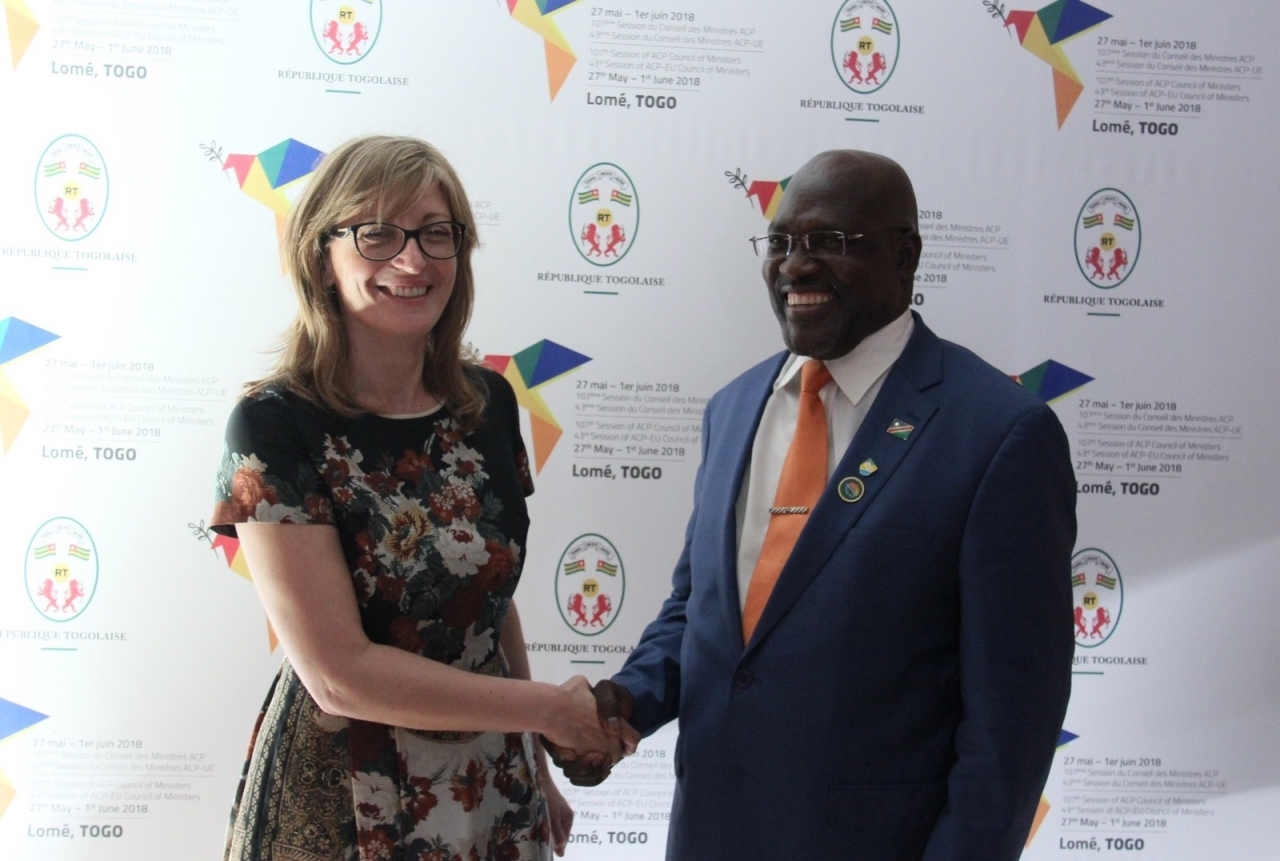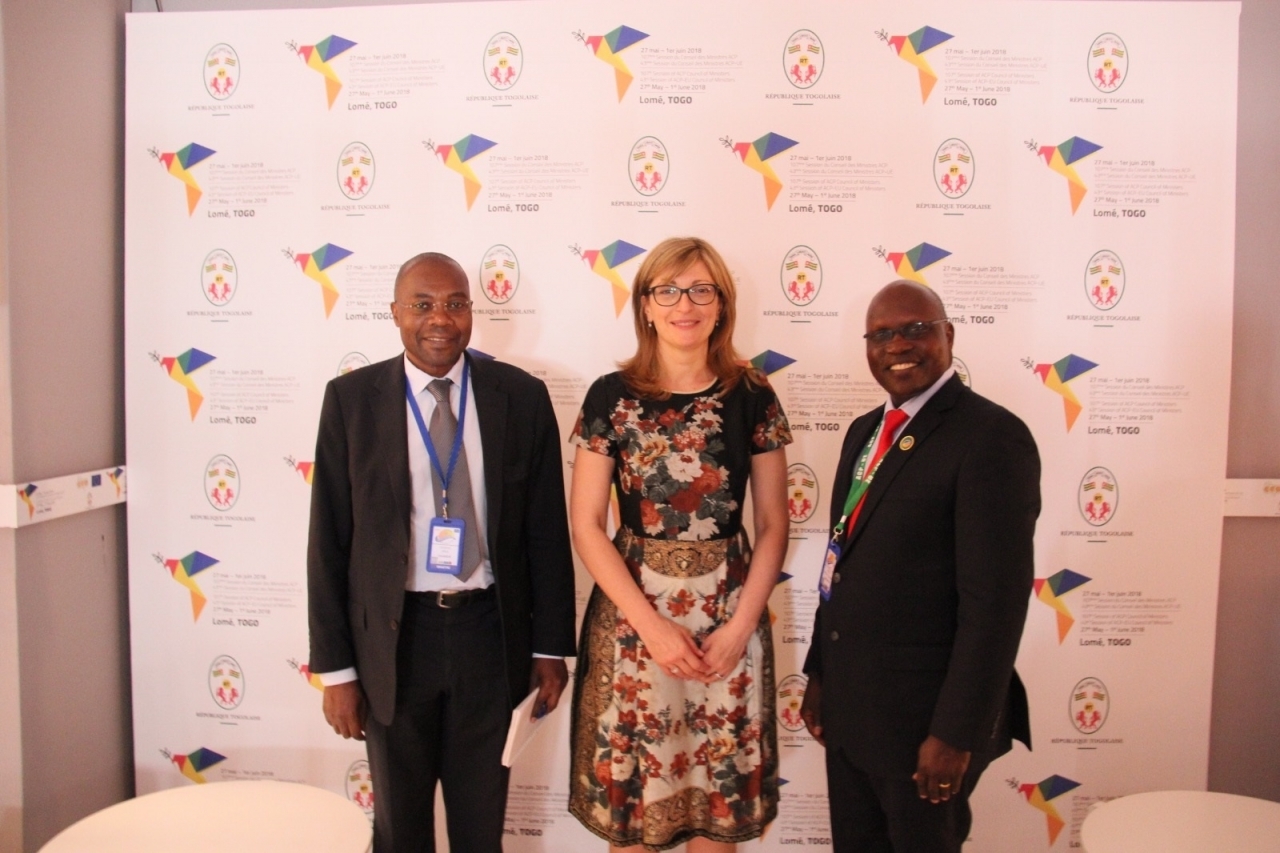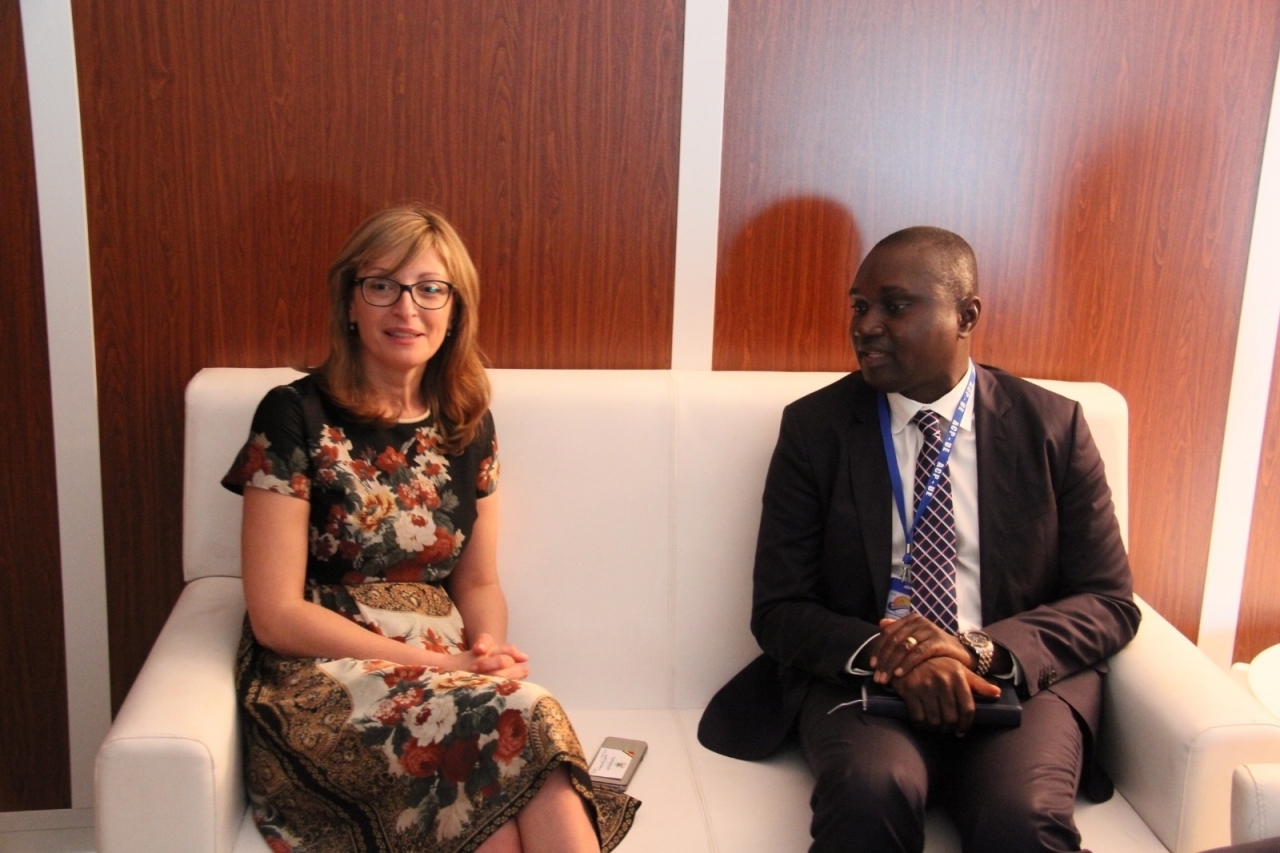Deputy Prime Minister Ekaterina Zaharieva Negotiates Bulgarian Business Comeback to Ghana, Namibia and Uganda
31 May 2018 News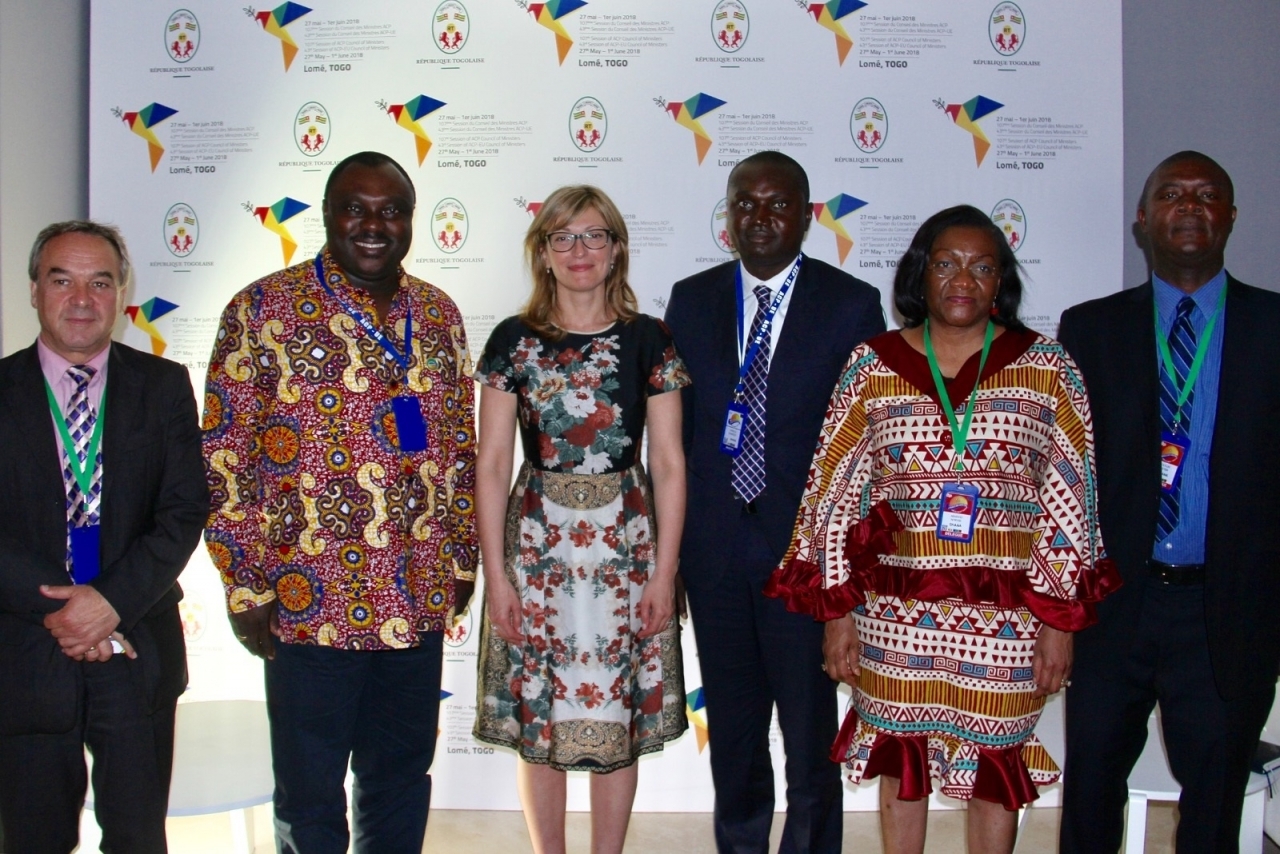
Deputy Prime Minister Ekaterina Zaharieva held bilateral meetings in Lomé, Togo, with the delegations of three more African States which expressed interest in attracting Bulgarian investments.
Ghana expects a resumption of the excellent trade relations with our country and new business investments in raw materials processing and medicines manufacture. Among its priorities, Namibia lists aid for development of high technologies and small and medium-sized enterprises and organising vocational training. Uganda shows interest in joint projects in food processing and the latest research products of the Bulgarian military-industrial complex companies.
Minister Zaharieva’s meetings were held within the framework of the 43rdSession of the Joint Council of Ministers of the European Union and the Africa, Caribbean, and Pacific Group of States (ACP), which will take place in Lomé, the capital of the Togolese Republic, over the next two days. The forum, which is attended by delegations of 79 States, will be co-chaired by Ekaterina Zaharieva because she heads the EU delegation in her capacity as President-in-Office of the Council of the European Union.
Earlier in Togo, she conferred with her Ethiopian and Togolese partners, who also expressed interest in attracting Bulgarian companies.
At her sessions with all partners from Africa, Zaharieva presented the opportunities for doing business with Bulgaria, the favourable tax system and the access to the European markets through our country. She called for the arrangement of joint intergovernmental meetings and forums of the chambers of commerce and business executives, at which Bulgarian entrepreneurs would be familiarised with the conditions for investments in their countries. All delegations with which bilateral meetings were held immediately responded to the proposals.
“As a result of the long-standing excellent relations between the Republic of Ghana and Bulgaria, many Ghanaian engineers, doctors and researchers have graduated in your country and contribute to the advancement of our economy and society,” Ghana’s Deputy Minister for Foreign Affairs and Regional Integration Charles Owiredu emphasised.
“Our Government is of the opinion that political relations should assist business. We have capabilities in aluminium and steel production and processing, as well as in the pharmaceutical industry,” said Ghana’s Deputy Minister for Trade and Industry Robert Lindsay.
Minister Zaharieva presented to them the capabilities of Bulgarian enterprises in these sectors, stressing the production of processed foods, generic medicines and veterinary medicines, along with potential cooperation with the Bulgarian IT sector.
“Political stability is a corollary to the pursuit of business and trade,” she emphasised.
The Republic of Ghana (area: 238,533 sq. km, population: 27 million) is a market economy with relatively few political barriers to trade and investment. In the natural resource-rich country, agriculture generates some 20 per cent of GDP and employs more than half of the labour force. An expanding oil industry has boosted Ghana’s economic growth, as the offshore Jubilee Oil Field began production in mid-December 2010.
Bulgaria and Ghana established diplomatic relations in July 1961.
In 2017, Bulgarian exports to the African country grew by 8.82% from 2016, reaching USD 11.1 million, while imports from Ghana dropped by 34.86% to USD 24.1 million.
Tjekero Tweya, Namibia’s Minister of Industrialisation, Trade and SME Development, also noted the traditional ties with our country at his session with Minister Zaharieva.
“Bulgaria has always supported Africa as a partner. There are ample opportunities for joint projects in mining and high technologies. Let us reactivate the Joint Trade and Economic Commission and revisit all areas in which we can have common interests,” Zaharieva told the Namibian Minister.
“We are not struggling to get aid but to attract business. We have a tremendous history with Bulgaria which cannot go unutilised. I could say that you understand us a lot better than most countries in Western Europe,” Minister Tweya emphasised.
In February 2013, Namibia was named the top emerging market economy in Africa. The mining industry is the backbone of the economy. Namibia is rich in mineral resources, it is the second largest producer of gem-quality diamonds after Botswana, ranks fourth in the extraction of uranium, and has the world’s largest potassium and lithium deposits. In Africa, it ranks second in the production of lead, third in the production of cadmium, and fourth in the production of zinc and copper.
Bulgaria and Namibia established diplomatic relations on 6 June 1990. The country remembers the help provided by Bulgaria in the fight against apartheid and the opportunity for Namibian students to obtain their education in Bulgaria. Two-way trade, however, is still insignificant. Bulgarian business circles are showing a gradually growing interest in the Namibian market, especially with the new opportunities for export of copper ore and concentrate.
“Uganda maintains traditionally good relations with Bulgaria and with the countries of Eastern Europe. We would like to send a delegation to country to strengthen contacts with your business community, especially in the field of the latest research products of your military-industrial complex, because we allocate substantial resources for security on account of the refugee flows,” said Uganda’s Minister of Finance, Planning and Economic Development Matia Kasaija. He presented his country’s new business-facilitating legislation and his Government’s desire to catalyse manufacturing, since the services sector is now the country’s principal source of revenue.
Uganda is planning to develop the oil sector in the coming years and is preparing to build the relevant infrastructure.
Diplomatic relations with Bulgaria were established on 16 May 1964. Until the closing of the Bulgarian Embassy in Kenya in 1990, the Bulgarian ambassador in Nairobi was also accredited to Kampala.
Minister Zaharieva invited a Ugandan delegation to visit Bulgaria, and proposed that expert teams of the two countries work for the conclusion of a convention for the avoidance of double taxation and an investment protection agreement.

